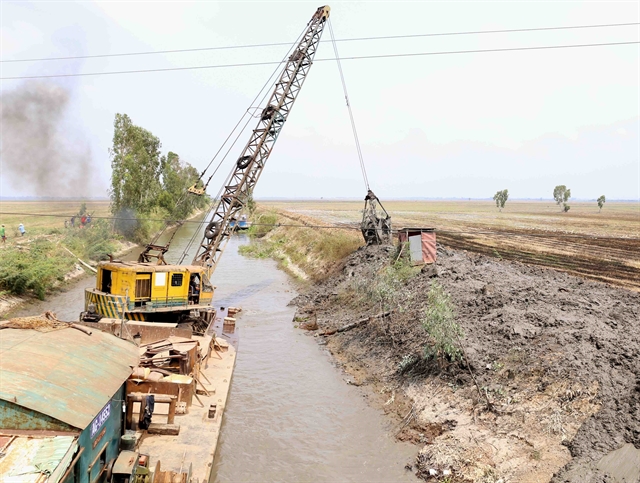 Society
Society


|
| A canal is dredged in the Mekong Delta province of An Giang. VNA/VNS Photo Vũ Sinh |
HCM CITY — Saltwater intrusion in the Cửu Long (Mekong) Delta is expected to increase between April 28 and May 6 as the volume of water flowing southward from the Mekong River will decline, according to the Ministry of Agriculture and Rural Development’s Irrigation Department.
High tides from the sea are also expected to deeply penetrate into river mouths, the department said.
Authorities in the delta have been told to take measures to protect agricultural production against saline intrusion.
The National Centre of Hydro-Meteorology Forecasting said that rainfall in the Tây Nguyên (Central Highlands) and the southern region in May is estimated to be 10-30 per cent lower than average.
To ensure irrigation water for the summer-autumn crop and mùa crops (which grow in the rainy season) as well as daily water for households, the centre has told departments of agriculture and rural development in the Tây Nguyên, southern and central regions to monitor hydro-meteorology and saline intrusion forecasts, and inspect available water resources.
The departments should also supply irrigation water to drought-prone areas where the summer-autumn crop and mùa crops are expected to be planted.
When available water resources cannot meet demand, localities should give priority for water to household use, animals and high-value perennial trees, the department said.
During the dry season this year, inclement weather has caused drought and saltwater intrusion in many areas in the country, including in the delta, affecting agricultural production and creating water shortages for thousands of households in the delta.
The delta’s provinces and Cần Thơ City have implemented many measures to mitigate the impact of saltwater intrusion.
They have dredged canals and ponds, dug wells, and built temporary dams and pumping stations to supply fresh water for drought- and saltwater-affected areas.
Authorities in the delta have encouraged farmers to strictly follow the growing schedules for the 2019 summer-autumn crop, which are sown between April and June.
In Trà Vinh Province, the Department of Agriculture and Rural Development has instructed farmers to sow the autumn-summer rice crop in three different periods and complete sowing according to schedules.
Lâm Quang Thao, head of the province’s Plant Protection and Cultivation Sub-department, said that farmers were told to use high-quality rice varieties resistant to drought and saltwater (such as OM 5451, OM 4900, OM 7347, OM 6976 and OM 4218) for the summer-autumn crop.
The province’s Department of Agriculture and Rural Development has ordered the Irrigation Work Exploitation and Management One Member Limited Company to develop plans to supply water for the autumn-summer crop.
In Long An Province, authorities have also told rice farmers in areas that must use rainwater and are without irrigation works to sow the autumn-summer rice only when there is rain. — VNS




